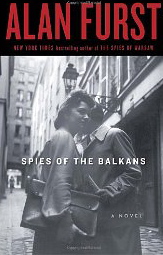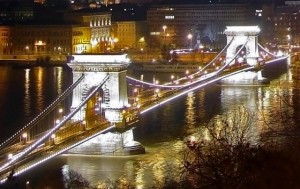“We pay a price for honor…such a cruel price…Perhaps that was what people meant by the phrase ‘the world is coming apart.’ But mostly you couldn’t question what they meant, because mostly they said it to themselves.”
The fraught e vents in the Balkans leading to the occupation of Greece by the Nazis in April, 1941, form the structure of this complex novel, which begins in Greece and ranges through Albania, France, Yugoslavia, Bulgaria, Hungary, and Turkey, as small, vulnerable Eastern European countries try to stave off both the Italians and the Nazis. Alan Furst, famous for his carefully researched espionage thrillers focusing on events from 1940 and 1941, recreates the confusions and the complications of the Balkan countries in early 1941, as they try to maintain some semblance of sovereignty against the massive war machine of Nazi Germany. With their different political systems, languages, and cultural sensibilities, their best chance for individual survival lies not within their own, often impotent, governments but within a loosely connected group of individuals from many European countries who may have access to information. Exhibiting little sense of trust of each other, some are associated with police and intelligence agencies, while others are committed private citizens who want to help the Jews escape the onslaught of the Reich. All want to stop Hitler, but all also have separate, private goals.
vents in the Balkans leading to the occupation of Greece by the Nazis in April, 1941, form the structure of this complex novel, which begins in Greece and ranges through Albania, France, Yugoslavia, Bulgaria, Hungary, and Turkey, as small, vulnerable Eastern European countries try to stave off both the Italians and the Nazis. Alan Furst, famous for his carefully researched espionage thrillers focusing on events from 1940 and 1941, recreates the confusions and the complications of the Balkan countries in early 1941, as they try to maintain some semblance of sovereignty against the massive war machine of Nazi Germany. With their different political systems, languages, and cultural sensibilities, their best chance for individual survival lies not within their own, often impotent, governments but within a loosely connected group of individuals from many European countries who may have access to information. Exhibiting little sense of trust of each other, some are associated with police and intelligence agencies, while others are committed private citizens who want to help the Jews escape the onslaught of the Reich. All want to stop Hitler, but all also have separate, private goals.

Forty-year-old Costa Zannis, a senior police official in the northern Greek city of Salonika, is in the middle of the conflict. Surrounded by Turkey to the east, Bulgaria to the northeast, Romania and Serbia to the north, Macedonia to the northwest, and Albania to the west, Zannis is all too aware of the threats to his country. Having lived in Paris for twelve years, however, he has family connections there; his most recent lover is a British woman with connections to intelligence operatives in her country; and, situated as he is, only a few kilometers from Turkey, Zannis also knows Turks who can be helpful.
When the Italians invade Albania, they come within a few kilometers of Greek soil. Their forays into Greece, however, are met with fierce resistance, and Zannis realizes that Germany will soon invade Greece to “rescue the dignity of her Italian partner.” The immediate issues regarding Balkan governments alternate with issues regarding aid for the escaping Jews, some of whom have important information, and Zannis walks a tightrope, doing his part to aid people in Germany who have risked their lives to save others. His life becomes even more complicated, however, by his suddenly developed attraction to the wife of one of Greece’s wealthiest men. Pressed by the British to provide intelligence information, Zannis cooperates to a degree, but he is far more concerned with helping his friends and compatriots, one of them a Sephardic Jew with whom he has worked for years, to escape Greece before the expected invasion by the Reich.

The novel, a chessboard of battle moves and countermoves, illustrates the intricate interactions among the various players in different Eastern Eurpoean countries as they attempt to save the Balkans from complete German domination. Unfortunately, the lack of characterization for these players makes the reader less involved in the action than one would expect, especially since this is a time which might have changed the course of world history forever. Costa Zannis is a fine policeman, but the reader knows little about him, and it is not until the end of the novel that the reader learns that his family is so large he will need ten visas if he is to get them out of the country. No effort is made to illustrate the conflicts between Emilia Krebs, a Jew in Berlin, dedicated to helping other Jews escape Germany, and her seemingly sympathetic husband, who happens to be a career officer on the General Staff of the German Wehrmacht. Zannis’s love for Demetria, the wife of one of the wealthiest men in Greece is convenient for the plot and its need for romance, but not explained in terms of character development.

Furst’s research into this period, as the Reich continues its seemingly inevitable march east, is fascinating for anyone interested in learning the extent to which individuals could set up unofficial, cross-border systems to spirit those in danger out of the Nazi sphere of influence, but the novel, overall, moves through so many countries with so many characters that readers become interested primarily in finding out how the author will ever resolve all these issues, rather than in understanding the big picture that underlies their activities. For those who are unfamiliar with this period, the book gives insights into why certain countries behaved as they did, and what would have been necessary to have changed the outcomes, but as a novel, Spies of the Balkans lacks the emotional investment of the reader which one expects of the best espionage fiction.
Notes: The author’s photo is here: http://magazine.fourseasons.com
Ikla’s Bar, at the Szechenyi Bridge in Budapest, is where Zannis meets with Gypsy Gus. http://upload.wikimedia.org
The Citroen Traction Avant, the favorite car of the German General Staff, is from http://en.wikipedia.org
